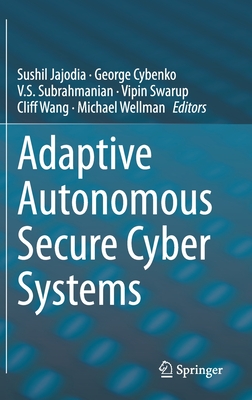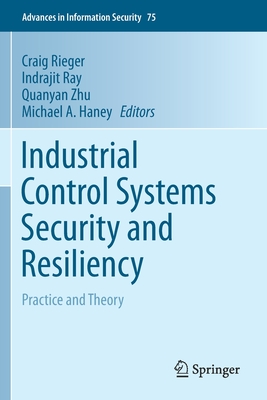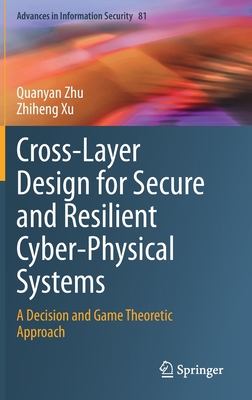Adaptive Autonomous Secure Cyber Systems
暫譯: 自適應自主安全網路系統
Jajodia, Sushil, Cybenko, George, Subrahmanian, V. S.
- 出版商: Springer
- 出版日期: 2021-02-05
- 售價: $7,120
- 貴賓價: 9.5 折 $6,764
- 語言: 英文
- 頁數: 289
- 裝訂: Quality Paper - also called trade paper
- ISBN: 3030334341
- ISBN-13: 9783030334345
海外代購書籍(需單獨結帳)
相關主題
商品描述
- Game and control theory-based moving target defenses (MTDs) and adaptive cyber defenses (ACDs) for fully autonomous cyber operations;
- The extent to which autonomous cyber systems can be designed and operated in a framework that is significantly different from the human-based systems we now operate;
- On-line learning algorithms, including deep recurrent networks and reinforcement learning, for the kinds of situation awareness and decisions that autonomous cyber systems will require;
- Human understanding and control of highly distributed autonomous cyber defenses;
- Quantitative performance metrics for the above so that autonomous cyber defensive agents can reason about the situation and appropriate responses as well as allowing humans to assess and improve the autonomous system.
This book establishes scientific foundations for adaptive autonomous cyber systems and ultimately brings about a more secure and reliable Internet. The recent advances in adaptive cyber defense (ACD) have developed a range of new ACD techniques and methodologies for reasoning in an adaptive environment.
Autonomy in physical and cyber systems promises to revolutionize cyber operations. The ability of autonomous systems to execute at scales, scopes, and tempos exceeding those of humans and human-controlled systems will introduce entirely new types of cyber defense strategies and tactics, especially in highly contested physical and cyber environments. The development and automation of cyber strategies that are responsive to autonomous adversaries pose basic new technical challenges for cyber-security.
This book targets cyber-security professionals and researchers (industry, governments, and military). Advanced-level students in computer science and information systems will also find this book useful as a secondary textbook.
商品描述(中文翻譯)
本書探討了對於自主網路防禦至關重要的基本科學問題。具體領域包括:
- 基於遊戲和控制理論的移動目標防禦(MTDs)和自適應網路防禦(ACDs),用於完全自主的網路操作;
- 自主網路系統在一個與我們目前操作的人類系統顯著不同的框架中設計和運作的程度;
- 在線學習算法,包括深度遞迴網路和強化學習,這些算法將用於自主網路系統所需的情境感知和決策;
- 人類對高度分散的自主網路防禦的理解和控制;
- 以上內容的定量性能指標,以便自主網路防禦代理能夠推理當前情況和適當的反應,同時允許人類評估和改進自主系統。
本書為自適應自主網路系統建立了科學基礎,最終實現更安全和可靠的互聯網。最近在自適應網路防禦(ACD)方面的進展,開發了一系列新的ACD技術和方法論,以便在自適應環境中進行推理。
物理和網路系統的自主性有望徹底改變網路操作。自主系統在規模、範圍和速度上超越人類及人類控制系統的能力,將引入全新的網路防禦策略和戰術,特別是在高度競爭的物理和網路環境中。針對自主對手的網路策略的開發和自動化,對網路安全提出了基本的新技術挑戰。
本書的目標讀者為網路安全專業人士和研究人員(包括業界、政府和軍事)。計算機科學和資訊系統的高級學生也會發現本書作為輔助教材非常有用。
作者簡介
George Cybenko is the Dorothy and Walter Gramm Professor of Engineering at Dartmouth. Professor Cybenko has made key research contributions in signal processing, neural computing, parallel processing and computational behavioral analysis. He was the Founding Editor-in-Chief of IEEE/AIP Computing in Science and Engineering and IEEE Security & Privacy. Professor Cybenko is a Fellow of the IEEE and received his BS (University of Toronto) and PhD (Princeton) degrees in Mathematics.
V.S. Subrahmanian is The Dartmouth College Distinguished Professor in Cybersecurity, Technology, and Society at Dartmouth College. Prof. Subrahmanian is one of the world leaders in logical reasoning with uncertainty, probabilistic logics, temporal probabilistic logics, and managing huge, heterogeneous databases with incomplete and inconsistent information, and multimedia databases. He serves on the boards of numerous journals including Science, ACM Transactions on Intelligent Systems & Technology, ACM Transactions on Computational Logic, and IEEE Transactions on Computational Social Systems.
Vipin Swarup is director of the Cyber Resilient Systems at the MITRE Corporation, McLean, VA. He is the recipient of MITRE's first Technology Transfer Individual Contribution Award for entrepreneurial leadership and success in transferring MITRE innovations to the government and industry. In the past, he has led many research projects as principal investigator and has published extensively in the cybersecurity literature. He holds a B.Tech. in Computer Science and Engineering from Indian Institute of Technology, Bombay, and an MS and Ph.D. in Computer Science from the University of Illinois at Urbana-Champaign. Cliff Wang graduated from North Carolina State University with a Ph.D. in computer engineering in 1996. He has been carrying out research in the area of computer vision, medical imaging, high speed networks, and most recently information security. He has authored around 40 technical papers and 3 Internet standards RFCs. Dr. Wang also served as an editor for nine books and hold three US patents on information security system development. Since 2003, Dr. Wang has been managing extramural research portfolio on information assurance at U.S. Army Research Office. In 2007 he was selected as the director of the computing sciences division at ARO while in the same time managing his program. Dr. Wang also holds adjunct faculty position at both Department of Computer Science and Department of Electrical and Computer Engineering at North Carolina State University.
Michael Wellman is Professor of Computer Science & Engineering at the University of Michigan. He received a PhD from the Massachusetts Institute of Technology in 1988 for his work in qualitative probabilistic reasoning and decision-theoretic planning. From 1988 to 1992, Wellman conducted research in these areas at the USAF's Wright Laboratory. For the past 25 years, his research has focused on computational market mechanisms and game-theoretic reasoning methods, with applications in electronic commerce, finance, and cyber-security. As Chief Market Technologist for TradingDynamics, Inc., he designed configurable auction technology for dynamic business-to-business commerce. Wellman previously served as Chair of the ACM Special Interest Group on Electronic Commerce (SIGecom), and as Executive Editor of the Journal of Artificial Intelligence Research. He is a Fellow of the Association for the Advancement of Artificial Intelligence and the Association for Computing Machinery.
作者簡介(中文翻譯)
Sushil Jajodia 是喬治梅森大學(George Mason University)沃爾根瑙工程學院(Volgenau School of Engineering)的大學教授、BDM國際教授,以及安全資訊系統中心的創始主任,位於維吉尼亞州的費爾法克斯。他的研究興趣包括安全性、隱私、資料庫和分散式系統。他已經撰寫或共同撰寫了七本書,編輯了43本書籍和會議論文集,並在經過審核的期刊和會議論文集中發表了超過450篇技術論文。他還擁有十七項專利。
George Cybenko 是達特茅斯學院(Dartmouth)的多蘿西與沃爾特·格拉姆工程學教授。Cybenko教授在信號處理、神經計算、平行處理和計算行為分析方面做出了重要的研究貢獻。他是IEEE/AIP《科學與工程計算》(Computing in Science and Engineering)和IEEE《安全與隱私》(Security & Privacy)的創始主編。Cybenko教授是IEEE的會士,並在多倫多大學獲得學士學位,於普林斯頓大學獲得數學博士學位。
V.S. Subrahmanian 是達特茅斯學院的網路安全、技術與社會傑出教授。Subrahmanian教授是邏輯推理、概率邏輯、時間概率邏輯以及管理龐大、異質的資料庫(包含不完整和不一致的信息)和多媒體資料庫的世界領導者之一。他在多本期刊的編輯委員會中任職,包括《科學》(Science)、ACM《智能系統與技術期刊》(Transactions on Intelligent Systems & Technology)、ACM《計算邏輯期刊》(Transactions on Computational Logic)和IEEE《計算社會系統期刊》(Transactions on Computational Social Systems)。
Vipin Swarup 是MITRE公司(MITRE Corporation)網路韌性系統的主任,位於維吉尼亞州麥克萊恩。他是MITRE首屆技術轉移個人貢獻獎的獲得者,因其在將MITRE創新轉移到政府和產業方面的企業領導和成功而獲獎。過去,他作為主要研究者領導了許多研究項目,並在網路安全文獻中廣泛發表。Swarup擁有印度理工學院孟買分校的計算機科學與工程學士學位,以及伊利諾伊大學香檳分校的計算機科學碩士和博士學位。Cliff Wang 於1996年從北卡羅來納州立大學獲得計算機工程博士學位。他一直在計算機視覺、醫學影像、高速網路以及最近的信息安全領域進行研究。他已撰寫約40篇技術論文和3篇互聯網標準RFC。Wang博士還擔任過九本書的編輯,並擁有三項美國專利,專注於信息安全系統的開發。自2003年以來,Wang博士一直在美國陸軍研究辦公室管理信息保障的外部研究項目。2007年,他被選為ARO計算科學部門的主任,同時管理他的計畫。Wang博士還在北卡羅來納州立大學的計算機科學系和電氣與計算機工程系擔任兼任教職。
Michael Wellman 是密西根大學的計算機科學與工程教授。他於1988年在麻省理工學院獲得博士學位,研究主題為定性概率推理和決策理論規劃。從1988年到1992年,Wellman在美國空軍的賴特實驗室進行這些領域的研究。在過去的25年中,他的研究專注於計算市場機制和博弈論推理方法,應用於電子商務、金融和網路安全。作為TradingDynamics, Inc.的首席市場技術專家,他設計了可配置的拍賣技術,用於動態的商業對商業交易。Wellman曾擔任ACM電子商務特別興趣小組(SIGecom)的主席,以及《人工智慧研究期刊》(Journal of Artificial Intelligence Research)的執行編輯。他是人工智慧促進協會(Association for the Advancement of Artificial Intelligence)和計算機協會(Association for Computing Machinery)的會士。












